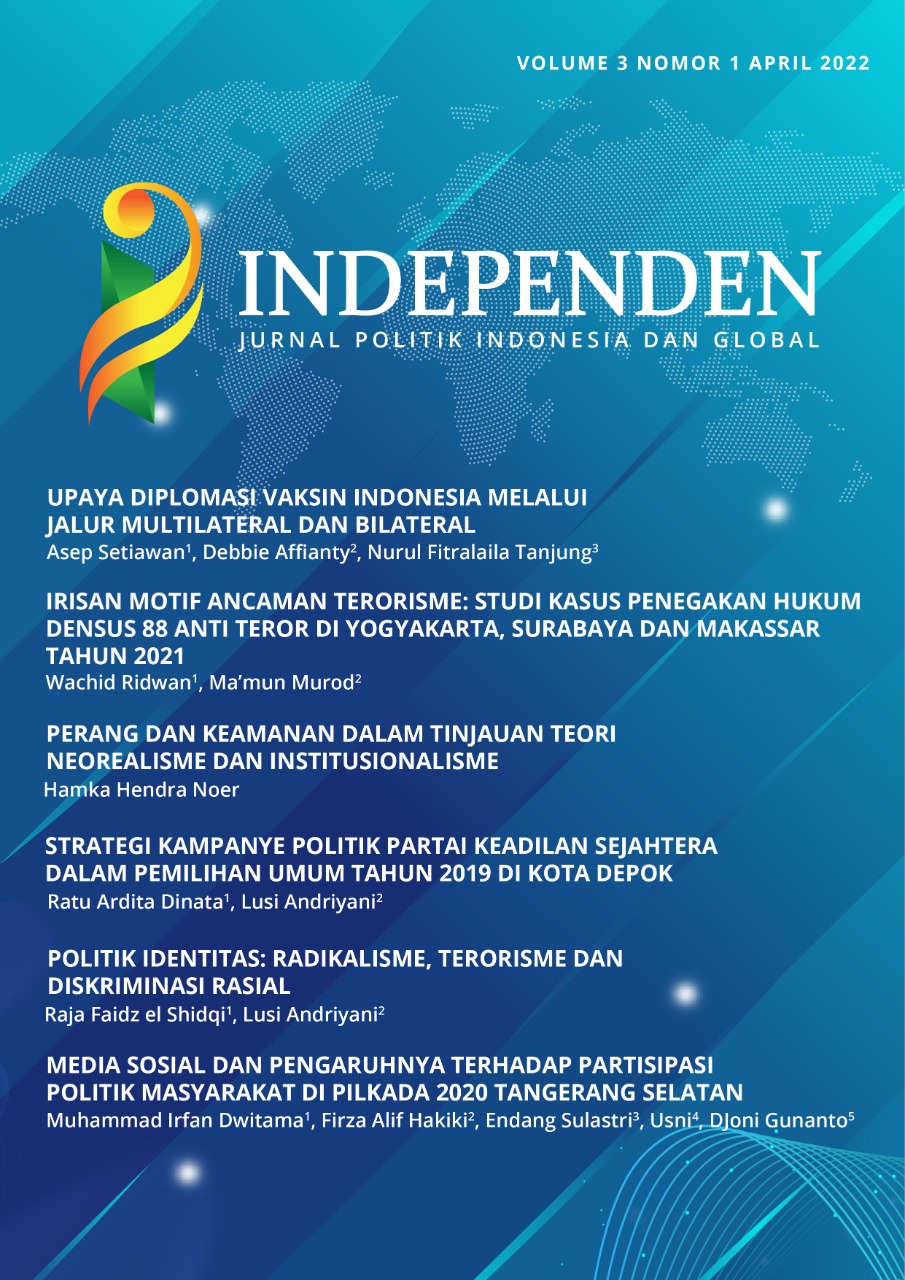PERANG DAN KEAMANAN DALAM TINJAUAN TEORI NEOREALISME DAN INSTITUSIONALISME
Main Article Content
Abstract
Article Details
References
Alagappa, M. (1995). Regionalism and Conflict Management: A Framework for Analysis. Review of International Studies 21(4), 359-387.
Alagappa, M. (pnyt.). (1998). Asian Security Practice: Material and Ideational Influences. Stanford, CA: Stanford University Press.
Alfian. (1986). Latar Belakang Terbentuknya ASEAN. Jakarta: Seknas ASEAN Departemen Luar Negeri Republik Indonesia.
Anthony, M. C. (2002). Partnership for Peace in Asia: ASEAN, The ARF, and The United Nations. Contemporary Southeast Asia 24(3), 528-548.
Baldwin, D. (pnyt.). (1993). Neorealism and Neoliberalism: The Contemporary Debate. New York: Columbia University Press.
Betts, R. (1994). Wealth, Power and Instability: East Asia and The United States After The Cold War. International Security 18(3), 34-77.
Bungin, B. (pnyt.). (2012). Analisis Data Penelitian Kualitatif: Pemahaman Filosofis Dan Metodologis Ke Arah Penguasaan Model Aplikasi. Jakarta: RajaGrafindo Persada.
Buzan, B & Segal, G. (1998). Rethinking East Asia Security. Dlm. Klare, M.T & Chandrani, Y. (Pnyt.). World Security, hlm. 117-132. Ed. Ke-3. New York: St. Martin’s Press.
Buzan, B., Waever., O & de Wilde. J. (1998). Security: A New Framework for Analysis. Boulder: Lynne Rienner.
Creswell, J. (2008). Educational Research, Planning, Conducting, and Evaluating Quantitative and Qualitative Research. Boston: Pearson.
Creswell. J. W. (1994). Research Design Qualitative and Quantitative Approaches. London: SAGE Publications.
Eckstein, A. (2003). Thucydides, The Outbreak of The Peloponnesian War, and The Foundation of International Systems Theory. Bulletin of The Institute of Historical Research, (24), 757-774.
Elga, Y. (2014). Kisah-Kisah Pembantaian Kejam dalam Peperangan Dunia. Yogyakarta: Palapa.
Gaddis, J. L. (1986). The Long Peace: Elements of Stability in The Postwar International System. International Security (10), 99-142.
Gaddis, J. L. (1990). Russia, The Soviet Union and The United States: An Interpretative History. New York: McGraw-Hill.
Hanson, V. D. (2005). A War Like No Other: How The Athenians and The Spartans Fought the Peloponnesian War. New York: Random House.
Irewati, A. (2014). Meninjau Mekanisme Penyelesaian Sengketa Perbatasan di ASEAN. Jakarta: LIPI.
Kamarulzaman, A., Bercovitch, J., & Oishi, M. (2002). The ASEAN Way of Conflict Management: Old Patterns and New Trends. Asian Journal of Political Science, 10(2), 21-42.
Kaplan, L. S. (1984). The United States and NATO: The Formative Years. Lexington, Ky: University Press of Kentucky.
Koehane, R & Nye, J. (1971). Transnational Relations and World Politics. Cambridge, Mass: Harvard University Press.
Koehane, R. (pnyt.). (1986). Neorealism and Its Critics. New York: Columbia University Press.
Koehane, R. (1989). Power and Interdependence: World Politics in Transition. Ed. Ke- 2. Boston: Little Brown.
Lipson, C. (1993). International Cooperation in Economic and Security Affairs. Dlm. Baldwin, D. (Pnyt.). Neorealism and Neoliberalism: The Contemporary Debate, hlm. 132-151. New York: Columbia University Press.
Morgenthau, H. J. (1978). Politics Among Nations: The Struggle for Power and Peace. Ed. Ke-5. New York: Alfred A. Knopf.
Nye, J. Jr. (2003). Understanding International Conflicts. Ed. Ke-4. New York: Longman.
Othman, Z. (2006). Demokrasi, Kepimpinan dan Keselamatan Dalam Politik Malaysia. Dlm. Mayudin, G., Hamil, J., Daud, S., & Zaini Othman. (Pnyt.). Neorealisme dan Institusionalisme dalam Perang dan Keamanan, hlm. 187-203. Bangi: Universiti Kebangsaan Malaysia.
Parameswaran, P. (2014). Explaining US Strategic Partnerships in The Asia-Pacific Region: Origins, Developments and Prospects. Contemporary Southeast Asia, 36(2), 262-289.
Pasaribu, S. (2019). Buku Sejarah Perang Dunia: History of The World War. Jakarta: Alexander Books.
Seknas ASEAN. (1986). ASEAN Selayang Pandang. Jakarta: Departemen Luar Negeri Republik Indonesia.
Suryohadiprojo, S. (2005). Si Vis Pacem Para Bellum: Membangun Pertahanan Negara Yang Modern Dan Efektif. Jakarta: Gramedia Pustaka Utama.
Viotti, P & Kauppi, M. (1999). Realism, Pluralism, Globalism and Beyond. Ed. Ke-3. Boston: Allyn and Bacon.
Walt, S. (1987). The Origins of Alliances. Ithaca, NY: Cornell University Press.
Waltz, K. (1954). Man, The State and War. New York: Columbia Universty Press.
Waltz, K. (1979). Theory of International Politics. New York: McGraw Hills.
Williams, P., Donald M.G., & Jay M. Shafritz. (Pnyt.). (1994). Classics Readings of International Relations. Belmont, CA: Wadsworth Publishing Co.

